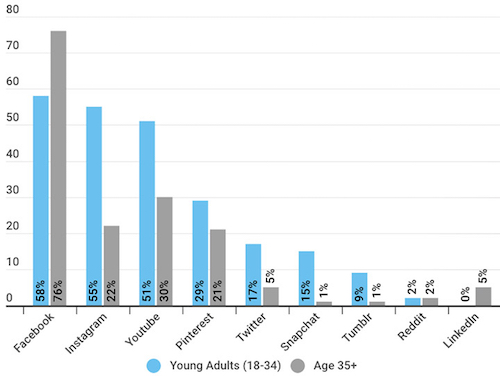Peers on social media and the use of online influencers are far more effective in reaching Millennials than older audiences, according to a report by real estate marketing company Clever.
The report, which surveyed Americans on their online media habits and overall sentiment toward online marketing, discovered that only slightly more than a third of consumers (37 percent) have bought a product or service this year due to an ad on social media. On the other hand, nearly twice that number of Millennial respondents (65 percent) admitted they’re more likely to buy a product or service if it’s recommended to them by a friend via social media, compared to only 40 percent of members belonging to the Baby Boomer generation.
Millennials also appear to be uniquely receptive to influencer marketing campaigns. According to the survey, Millennials are 54 percent more likely than older generations to buy a product or service recommended by an influencer. Nearly half (44 percent) of Millennials admitted they’ve already bought a product or service because of an influencer, compared to only 28 percent of Boomer and Gen X respondents.
Facebook remains the dominant social media platform for reaching the largest possible audiences across generations, according to the survey, but for younger Americans its influence appears to be slipping. The Cambridge Analytica scandal may have played a role in this sea change, as a clear majority (77 percent) of Millennials said they’re concerned about Facebook’s use of personal data. While 58 percent of Millennials admitted that they’ve bought a product from Facebook, video- and photo-driven sites are increasingly closing the gap in becoming Millennials’ go-to social channels for purchases, as 55 percent and 51 percent of Millennials said they’ve bought a product via YouTube and Instagram, respectively.
 Have you bought a product or service because of an ad on any of the following platforms? Have you bought a product or service because of an ad on any of the following platforms? |
The survey also found that Millennials are less inclined to divulge their personal information online: only 32 percent said they’d provide their name, email and phone number in exchange for an informative downloadable guide or resource. However, the appearance of an app or website may hold some power in swaying this decision: 92 percent said a site or app’s appearance was important when deciding whether or not to submit personal information.
Clever's report surveyed nearly 1,140 U.S. adults in March. The survey was conducted by online polling platform Pollfish.


 Abandon traditional content plans focused on a linear buyer progression and instead embrace a consumer journey where no matter which direction they travel, they get what they need, stressed marketing pro Ashley Faus during O'Dwyer's webinar Apr. 2.
Abandon traditional content plans focused on a linear buyer progression and instead embrace a consumer journey where no matter which direction they travel, they get what they need, stressed marketing pro Ashley Faus during O'Dwyer's webinar Apr. 2. Freelance marketers and the companies that hire them are both satisfied with the current work arrangements they have and anticipate the volume of freelance opportunities to increase in the future, according to new data on the growing freelance marketing economy.
Freelance marketers and the companies that hire them are both satisfied with the current work arrangements they have and anticipate the volume of freelance opportunities to increase in the future, according to new data on the growing freelance marketing economy. Home Depot's new attempt to occupy two market positions at once will require careful positioning strategy and execution to make it work.
Home Depot's new attempt to occupy two market positions at once will require careful positioning strategy and execution to make it work. Verizon snags Peloton Interactive chief marketing officer Leslie Berland as its new CMO, effective Jan. 9. Berland succeeds Diego Scotti, who left Verizon earlier this year.
Verizon snags Peloton Interactive chief marketing officer Leslie Berland as its new CMO, effective Jan. 9. Berland succeeds Diego Scotti, who left Verizon earlier this year.  Norm de Greve, who has been CMO at CVS Health since 2015, is taking the top marketing job at General Motors, effective July 31.
Norm de Greve, who has been CMO at CVS Health since 2015, is taking the top marketing job at General Motors, effective July 31.


 Have a comment? Send it to
Have a comment? Send it to 
No comments have been submitted for this story yet.